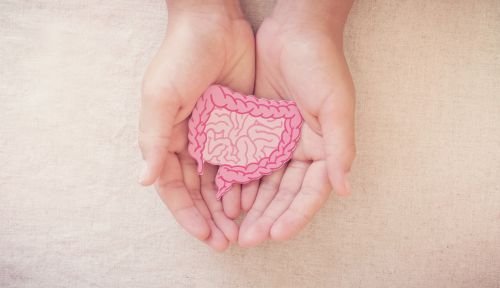Constipation is a condition in which a person has difficulty or infrequent bowel movements. This usually happens when the stool becomes hard and difficult to pass. This problem can cause discomfort and pain. In addition, long-term constipation can lead to other health problems.1
Constipation can be temporary or long-term. Temporary constipation can be caused by food choices, changes in physical activity, or stress. Long-term constipation may be related to more serious health problems, such as bowel disease or the use of certain medications.
Long-term constipation can cause more problems. For example, hemorrhoids or anal fissures may occur. In addition, long-term constipation can cause psychological stress and reduce the quality of life.

What causes constipation?
Constipation can be caused by various factors. One of the most common is poor nutrition. It can be related to small fibers amount in the diet, too little fluid intake, or too much "solid" food intake.
Another common cause of constipation is lack of physical activity. Physical activity helps food move through the intestines and thus prevents constipation. Also, some medications can cause constipation as a side effect.
Constipation can also be caused by certain medical conditions, such as diabetes, Parkinson's disease, hypothyroidism, or depression. Finally, constipation can be caused by various intestinal problems, such as intestinal obstruction or intestinal dysfunction.
Interesting facts about constipation
- Constipation is one of the most common digestive problems. It is estimated that about 20 percent of adults suffer from constipation.
- Women suffer from constipation more often than men. This can be related to hormonal changes, especially during pregnancy.
- Constipation can cause hemorrhoids. Hemorrhoids are swollen, inflamed veins in the rectum and anus.
- Although most cases of constipation are temporary, some people may experience long-term constipation, which can have serious health consequences.

How to recognize the signs of constipation
Constipation symptoms can range from mild to severe. These may include less than usual, difficulty or pain when passing a bowel movement, feeling too strong after passing a bowel movement, or feeling that there is still stool left in the bowel.
Other symptoms of constipation may include bloating, abdominal pain or discomfort, flatulence, diarrhea (which can be a complication of constipation), general malaise or fatigue.
If you notice any of these symptoms, you should see your doctor. He will be able to perform the necessary tests and determine whether you need treatment for constipation.
Health risks associated with constipation
Constipation, especially long-term, can cause serious health problems. For example, it can cause hemorrhoids, dilation of the vascular tissues of the anus. In addition, constipation can lead to intestinal obstruction, where stool blocks the bowel, causing pain.
Another serious health problem that constipation can cause is intestinal perforation. This is a condition where the intestinal wall ruptures, allowing stool to enter the abdominal cavity. This is a life-threatening condition that requires immediate medical attention.

Proven ways to prevent constipation
There are several ways to prevent constipation. First of all, it is important to follow a healthy diet. This means you should eat more fiber-rich foods like whole grains, vegetables, and fruits. Fiber helps to regulate bowel movements and facilitate the passage of stool.
Second, it is recommended drink more water. Water not only helps soften the stool, but also promotes bowel movement. You should also avoid alcohol caffeine, because they can cause dehydration, which is one of the causes of constipation.
Third, it is important to be physically active. Physical activity promotes bowel movement and helps prevent constipation. It can be any activity that you like, such as walking, running, swimming or cycling.
Effective solutions in the fight against constipation
An effective constipation treatment strategy can be highly individualized, depending on what your symptoms are and what is causing them. First of all, it is important to change your lifestyle and diet. Getting more exercise, drinking more fluids and eating foods with more fiber can help. This can help ease the movement of stool through the intestines.
Additionally, there are some medications that can help relieve constipation. These can include everything from natural remedies like flaxseed to prescription drugs. However, it is important to consult your doctor or pharmacist before starting any treatment.
Finally, if your constipation is related to a medical condition or if it doesn't improve with lifestyle and dietary changes, you may need specialized treatment. Consultation with a gastroenterologist, specialized therapy or even surgical treatment may be required.

Dietary changes to reduce constipation
One of the most effective ways to help prevent constipation is through proper nutrition. First, it's important to include more fiber in your diet. Fiber is a natural food component that helps normalize stool consistency and promotes regular bowel movements. Sources can include fruits, vegetables, legumes, grains and seeds or supplements.
-
Sale Product on saleKIKI Health Organic PSYLLIUM HUSKS - Natural Fiber for the gut, 120 capsules
39,90 €Original price was: 39,90 €.31,90 €Current price is: 31,90 €.Rated 5.00 out of 5 based on 4 customer ratings
In addition, it is important to drink enough fluids. Fluids help the fiber to swell and soften the stool, making it easier to move through the intestines. Water, undiluted tea, fruit juice can be a good choice.
Finally, it is important to try to eat regularly. This can help maintain regular bowel movements and prevent constipation.
Medical treatment for severe constipation
Severe constipation may require more intensive treatment. This may include taking medication to help stool pass through the intestines. Medicines can be given orally or as an enema.
In addition, medications can be used to help relax the muscles of the intestinal wall and facilitate bowel movements. These medications may be used in conjunction with other treatments, such as dietary changes or increased physical activity.
Finally, severe constipation may require specialized treatment such as physiotherapy, biofeedback therapy or even surgery. It is important to start treatment as early as possible to avoid more serious complications.

Tips for dealing with long-term constipation
Long-term constipation can be extremely difficult and can have a serious impact on your quality of life. However, there are some strategies that can help you deal with this problem.
First of all, it is important to maintain a regular rhythm of life. Try to eat at the same time every day, which can help regulate your bowel movements.
Second, try to maintain an active lifestyle. Physical activity can help stimulate bowel movements and ease the passage of stool.
Finally, don't forget to support your emotional well-being. Stress and anxiety can lead to constipation, so it's important to find ways to relax and manage stress.
Supplements that help relieve constipation
Some nutritional supplements can help relieve the symptoms of constipation. For example, probiotics can help restore intestinal microflora and improve intestinal function. Additionally, flaxseed, psyllium fiber, and magnesium supplements can also help regulate bowel movements.
However, you should consult your doctor or pharmacist before taking any dietary supplement. They will be able to advise you on which supplement may be right for your situation and how to take it safely.
Remember that supplements should not be used as the only strategy for treating constipation. They should be used in conjunction with other lifestyle and dietary changes.
Frequently asked questions about constipation
Could constipation be a sign of a serious illness?
Yes, sometimes constipation can be a symptom of a serious illness such as colitis or bowel cancer. Therefore, if your constipation is long-term, recurring, or associated with other serious symptoms, you should consult your doctor.
Can constipation be caused by stress?
Yes, stress can affect your bowel function and cause constipation. This is because stress can disrupt the nerve signals that regulate bowel movements.
Can constipation be caused by medication?
Yes, some medications, such as iron supplements, some antidepressants, and some pain medications, can cause constipation. If you think your constipation may be caused by medication, you should consult your doctor or pharmacist.
Conclusion: How to overcome constipation and maintain gut health
Constipation can be an uncomfortable and sometimes painful disorder, but it can usually be resolved with the right treatments. The most important thing is to maintain a healthy lifestyle, include more fiber in your diet, drink enough fluids and try to eat regularly. Taking certain supplements, such as probiotics, flaxseed, or magnesium supplements, may also be helpful.
However, if your constipation is long-lasting, recurring, or associated with other serious symptoms, you should consult your doctor. They can advise you on the right treatment strategy and help you avoid more serious complications.
Remember that gut health is an important part of your overall body health. By maintaining your gut health, you can help prevent constipation and other bowel problems, as well as improve your overall health and well-being.












